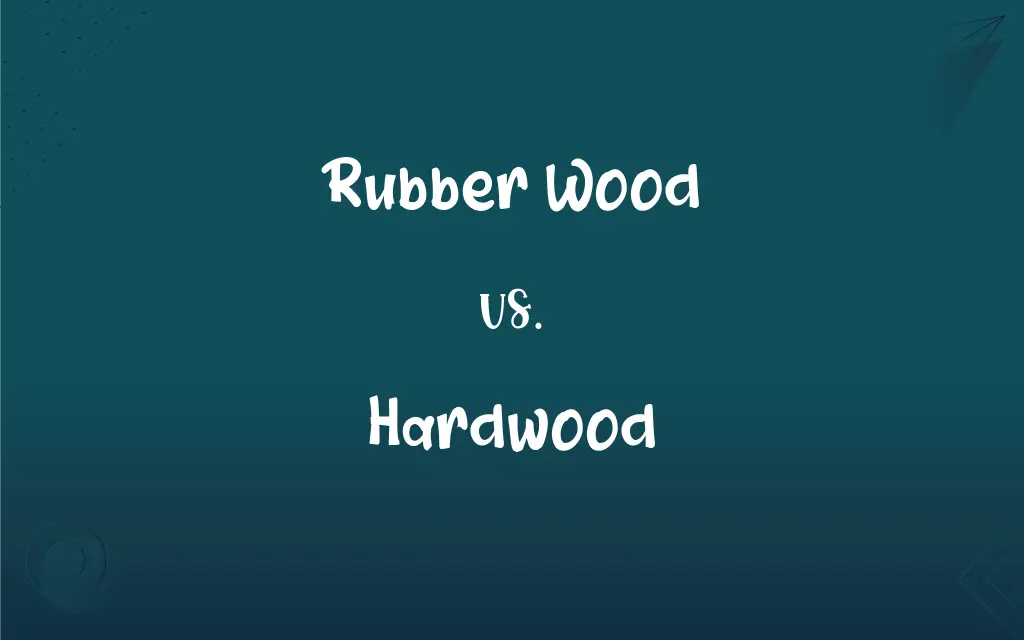Rubber Wood vs. Hardwood: What's the Difference?
Edited by Aimie Carlson || By Harlon Moss || Updated on June 9, 2024
Rubber wood is wood from the rubber tree, while hardwood refers to dense wood from deciduous trees or evergreens.

Key Differences
Rubber wood originates from the rubber tree, mainly found in Southeast Asian countries. Hardwood, on the other hand, is derived from deciduous trees or some evergreen species that shed their leaves annually.
Rubber wood, after the tree has stopped producing latex, is considered an environmentally friendly wood. Hardwood trees, due to their long growth period, are often sourced from forests, raising concerns about deforestation.
Rubber wood tends to be light in color and possesses a moderate density, making it relatively easy to work with. Hardwood varies in color and density based on the specific species but is generally more robust and durable than rubber wood.
When considering durability, rubber wood is moderately durable but may not withstand external elements as effectively as hardwood. In contrast, many hardwoods are known for their longevity and resistance to wear and tear.
In terms of cost, rubber wood is often more affordable because it is a byproduct of the rubber industry. Hardwood, due to its quality, aesthetic appeal, and durability, tends to be more expensive.
ADVERTISEMENT
Comparison Chart
Source
Derived from the rubber tree
Comes from deciduous trees or some evergreens
Environmental Impact
Eco-friendly as it uses trees that no longer produce latex
Concerns related to deforestation due to slow growth
Durability
Moderate durability
Highly durable and resistant to wear and tear
Appearance
Generally light in color
Can vary greatly in color and grain pattern
Cost
Typically more affordable
Generally more expensive due to quality and durability
ADVERTISEMENT
Rubber Wood and Hardwood Definitions
Rubber Wood
A cost-effective wood alternative to traditional hardwoods.
For budget-friendly options, consider rubber wood furniture.
Hardwood
Typically more expensive due to its superior quality and appeal.
Their home was adorned with premium hardwood furnishings.
Rubber Wood
A moderately durable wood often used in furniture making.
This dining set made of rubber wood has lasted us years.
Hardwood
Wood that varies in color, grain pattern, and density based on species.
The varying tones of hardwood floors add character to homes.
Rubber Wood
Wood harvested from mature rubber trees that have ceased latex production.
The furniture was crafted from high-quality rubber wood.
Hardwood
Known for its durability and longevity.
Many families invest in hardwood furniture for its lasting quality.
Rubber Wood
Known for its light color and even grain.
We chose rubber wood because of its appealing light shade.
Hardwood
Used widely in furniture, flooring, and cabinetry due to its robust nature.
Hardwood cabinets are preferred for their resilience and beauty.
Rubber Wood
An eco-friendly wood option, as it utilizes trees post latex-harvest.
She preferred rubber wood for its sustainability and environmental benefits.
Hardwood
Dense wood derived from trees that shed their leaves annually or from certain evergreens.
The floor was made of beautiful, shiny hardwood.
Hardwood
The wood of a eudicot or a magnoliid, such as an oak, maple, or magnolia.
Hardwood
A eudicot or magnoliid tree.
FAQs
What is rubber wood?
Rubber wood is wood sourced from the rubber tree, primarily after it stops producing latex.
Why is rubber wood considered eco-friendly?
Rubber wood utilizes trees that have ceased latex production, making it a sustainable choice.
Why is hardwood often more expensive than rubber wood?
Hardwood tends to be more costly due to its quality, durability, and aesthetic appeal.
Are all hardwoods dark in color?
No, the color of hardwood varies greatly based on the species.
Is hardwood flooring scratch-resistant?
While hardwood is durable, it can still be scratched. Some finishes can help protect against this.
Is hardwood the same as rubber wood?
No, hardwood is dense wood from deciduous trees or certain evergreens, while rubber wood is from the rubber tree.
Why are hardwoods called "hard"?
The term "hardwood" relates to the wood's density and strength, often derived from trees with slower growth patterns.
Which is more durable: rubber wood or hardwood?
Generally, hardwood is more durable than rubber wood.
Which is heavier: rubber wood or hardwood?
This can vary, but generally, hardwood is denser and heavier than rubber wood.
How is hardwood sourced?
Hardwood is sourced from deciduous trees or some evergreens, often raising deforestation concerns.
Do rubber trees produce rubber their entire life?
No, rubber trees produce latex for a limited number of years. Afterward, the wood is harvested.
Is hardwood sustainable?
Hardwood can be sustainable when sourced responsibly from managed forests or plantations.
What are the environmental implications of using hardwood?
The main concern is deforestation. Responsible sourcing and certification like FSC can mitigate this.
Why would someone choose rubber wood over hardwood?
Reasons might include cost-effectiveness, environmental concerns, and specific aesthetic preferences.
Where is rubber wood commonly found?
Rubber wood is predominantly found in Southeast Asian countries.
Is rubber wood good for furniture?
Yes, rubber wood is often used for furniture due to its affordability and moderate durability.
Can both rubber wood and hardwood be stained?
Yes, both can be stained, though the result may vary based on wood type and grain.
Which lasts longer: a rubber wood table or a hardwood table?
Generally, a hardwood table will have a longer lifespan due to its inherent durability.
How do I care for rubber wood furniture?
Regular dusting, avoiding excessive moisture, and using mild wood cleaners can help maintain its appearance.
Can rubber wood be used outdoors?
While it's possible, rubber wood isn't as durable as many hardwoods against external elements.
About Author
Written by
Harlon MossHarlon is a seasoned quality moderator and accomplished content writer for Difference Wiki. An alumnus of the prestigious University of California, he earned his degree in Computer Science. Leveraging his academic background, Harlon brings a meticulous and informed perspective to his work, ensuring content accuracy and excellence.
Edited by
Aimie CarlsonAimie Carlson, holding a master's degree in English literature, is a fervent English language enthusiast. She lends her writing talents to Difference Wiki, a prominent website that specializes in comparisons, offering readers insightful analyses that both captivate and inform.































































